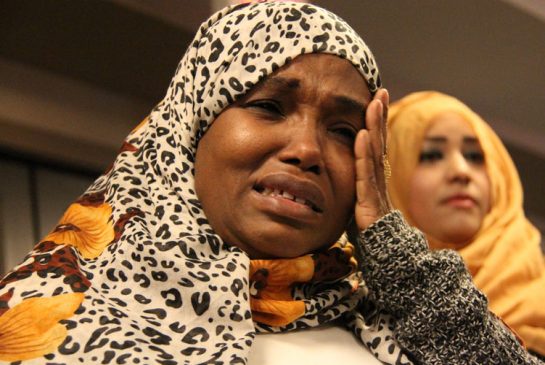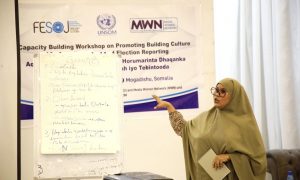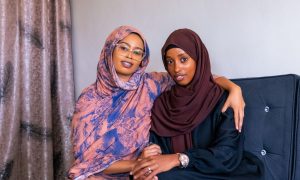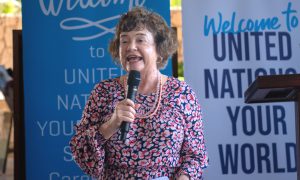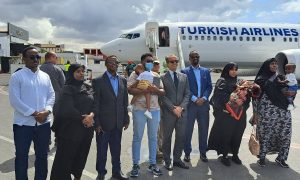
Khadija Ahmed, who has not seen her baby in six years, says the Canadian government asked her for DNA tests to prove that she is his mother.
Somalian refugee Khadija Ahmed cries while talking about her now six-year-old son that she was forced to leave behind with her husband when she was offered the opportunity to move to Canada as a refugee.
Every day, refugee Khadija Ahmed cries for the child she left behind in war-torn Somalia.
In 2009, the mother of four, who now lives in Surrey with her three teenage sons, was faced with a heart-wrenching decision no mother should ever have to make: to stay with her newborn son and husband in Yemen, where they were living after fleeing Somalia, or to leave her baby behind to build a new life in Canada with her three older boys.
She chose Canada, with the hope that her husband and young son, Nassib, would be able to join her soon after. But six years later, Ahmed said her husband and now six-year-old boy are homeless, again living in Somalia, and struggling to survive.
 Khadija Ahmed breaks down in tears after speaking to reporters on Monday.
Khadija Ahmed breaks down in tears after speaking to reporters on Monday.
Meanwhile, she said the Canadian government has asked for DNA tests to prove that she is Nassib’s mother before the young boy will be allowed into the country.
“All I can do is just worry, think and cry,” Ahmed said, using her son Zack Abdi, 17, as an interpreter. “I can’t sleep. I’m not happy spiritually. Every time I think about it I have a headache.”
Ahmed was one of several mothers who gathered at Vancouver City Hall on Monday with representatives of the Canadian Immigrant Settlement Sector Alliance, or CISSA, as well as B.C.’s representative for children and youth, Mary Ellen Turpel-Lafond, to plead with the Canadian government to help them bring their children and family members to this country.
 Khadija Ahmed holds a photo of her son, Nassib, who was only a month old when she was forced to leave him with her husband in Yemen. The father and son are now homeless in Somalia.
Khadija Ahmed holds a photo of her son, Nassib, who was only a month old when she was forced to leave him with her husband in Yemen. The father and son are now homeless in Somalia.
CISSA chair Chris Friesen urged the federal government to put refugee children first in its efforts to increase refugee re-settlement in Canada.
“It is simply inhumane to have to wait one, four, or even six years to be reunited with your family,” Friesen told reporters. “The impact of trauma and family separation can have long term implications for a child’s social, emotional and mental wellbeing.”
Turpel-Lafond urged the federal government to adhere to the UN Convention on the Rights of the Child.
Doing so, she said, would include expanding the definition of family to include extended relatives like grandparents, uncles, aunts, nephews and nieces, as well as expediting the reunification of children from refugees who sought asylum in Canada and were approved for permanent residency, and offering permanent resettlement or visitor visas on humanitarian grounds to family members of refugees.
Mary Ellen Turpel-Lafond, B.C.’s representative for children and youth, urged the Canadian government to adhere to the UN Convention on the Rights of the Child and making it a priority to reunite refugee parents and children.
“The UN Convention on the Rights of the Child is clear about every young person’s right to grow up with his or her family. But what about those whose families are elsewhere, separated by borders and visas?” asked Turpel-Lafond. “Family reunification must be a priority in settling refugees.”
Before she arrived in Canada, Ahmed and her children had fled civil war in Somalia and were living in Yemen when she applied for resettlement.
When she heard nothing about her application, however, she said she gave up hope, eventually remarrying and having her son.
Just two weeks after Nassib was born, Ahmed found out her re-settlement application had been accepted. Without her new husband and son on the application, however, she could not bring them with her to Canada.
 Zack Abdi, 17, comforts his mother Khadija Ahmed while she cries over her young son and husband who she left behind in Somalia when she came to Canada as a refugee.
Zack Abdi, 17, comforts his mother Khadija Ahmed while she cries over her young son and husband who she left behind in Somalia when she came to Canada as a refugee.
Since she arrived in Surrey with her three sons— Zack, 17, Arafat, 16 and Mohammed, 13— Ahmed said she is struggling to adjust to life in Canada.
The stress of worrying about her husband and son, who returned to Somalia from Yemen and are living on the street, made it difficult for her to study English and take her citizenship test.
“I’m so tired. My son and my husband, they’re so tired,” she said. “Canada helped me with my family when I came to Canada, but yet I need help with reuniting with my family I left in the streets.”
Son Zack said he was excited to come to Canada when he first found out that they would be leaving Yemen. But now, seeing his mother’s anguish, he said he feels Canada has failed his family.
“Every night, I see her cry. We’re struggling here,” he said. “Her husband is a hardworking guy. He can get a job. He can help us with the house and rent. The faster they come, the faster she gets healthy and happy.”
.
_____________________________________________________________________________________
Xafiiska Wararka Qaranimo Online | Mogadishu, Somalia
_____________________________________________________________________________________Advertisement
_____________________________________________________________________________________


